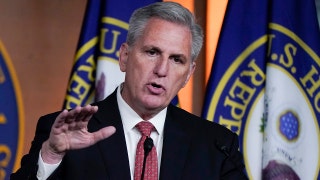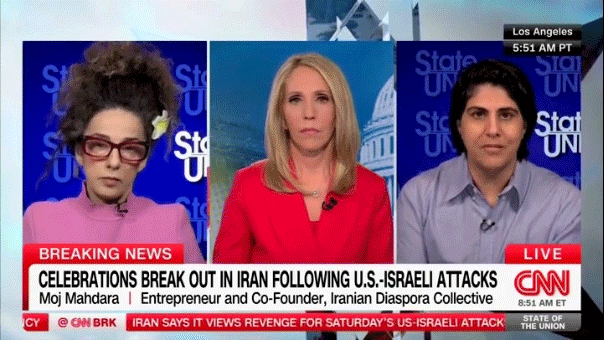One month after Nashville school shooting, schools consider arming teachers
As the rate of school shootings increase, school districts are looking for new ways to keep kids safe. For some, that involves adding more guns on campus.
Indiana's schools are increasingly adopting policies that allow teachers to carry firearms, a move that experts say could improve response times but may also pose unnecessary risks to students and educators.
As an Indiana resident and teacher at Pendleton Heights High School, Cameron Heinz said the decision to arm teachers is a "complex" and "highly debated" policy that has been implemented in neighboring school districts.
As such, the decision to do so has unique advantages and disadvantages that can be accentuated or mitigated depending on logistics and measures imposed by local government and school staff.
Three of the main advantages, Heinz said, encompass reduced response time, a heightened level of deterrence and enhanced safety protocols.
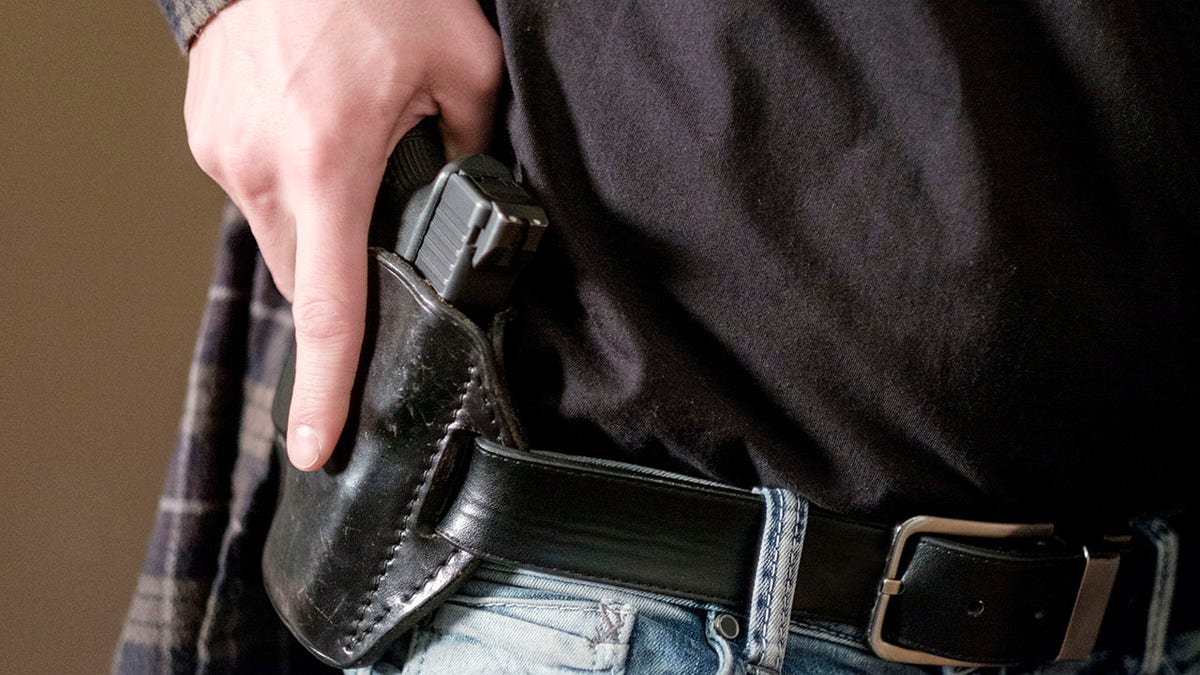
A man drawing a gun from a leather holster on his belt. (iStock)
For example, trained educators already on the scene can immediately intervene and protect students and fellow staff. Additionally, the presence of armed personnel on school grounds can dissuade potential shooters from targeting their school in the first place.
Schools that arm teachers also often implement rigorous safety protocols and training programs, which can lead to heightened preparedness for various emergencies.
"In rural areas of Indiana, where law enforcement response times may be longer, having armed teachers can bridge the gap and provide a timely response to threats," Heinz added.
But the decision to arm teachers can also pose safety risks, negatively impact the school atmosphere and act as an unnecessary use of resources.
Critics of arming teachers often note that the risk of accidental discharges or mishandling of firearms can exacerbate the potential for danger. Some also worry that armed educators may create a tense or fearful atmosphere among students, impacting their well-being and academic performance.
TEXAS SCHOOL DISTRICT APPROVES POLICY ALLOWING SOME EMPLOYEES TO BE ARMED

Schools in Indiana are now setting up covert "armed response teams" to train staff on the use of deadly force. (iStock)
At least seven school corporations in Indiana are in the process of setting up secret "armed response teams" that train staff on the use of deadly force and allow teachers access to firearms locked up in biometric safes.
Indiana's lawmakers gave districts the authority to allow teachers to carry firearms following the 2012 Sandy Hook Elementary School mass shooting that killed 20 children and six others.
In the time that has passed, at least four Indiana school corporations have already allowed teachers to carry or access firearms. The corporations stated a lack of police resources in schools helped to facilitate the decision.
Brady Center President Kris Brown told FOX News Digital that there is "no evidence" to suggest that arming teachers in schools will keep students safe from the impacts of gun violence.
Citing a report from the Giffords Law Center, Brown noted there have been nearly 100 publicly recorded instances of mishandled firearms in schools between 2017 and 2022. The research included examples where students gained access to a teacher's or staff member's firearm, when a school resource officer's firearm was unintentionally discharged, or when personal disputes escalated into gunfire.
"We saw how tragically ineffective arming teachers can be in the March shooting at Nashville's Covenant School," Brown added. "Several teachers were armed, yet they did not stop the shooter from killing three staff members and three children. The way to prevent shootings isn't adding more guns to our schools — it's by preventing people who wish to do harm from obtaining them in the first place."
MORE WOMEN TURNING TO FIREARMS FOR SELF-DEFENSE TO EVEN THE SCALES: PROTECTING 'THE LIVES WE LOVE'
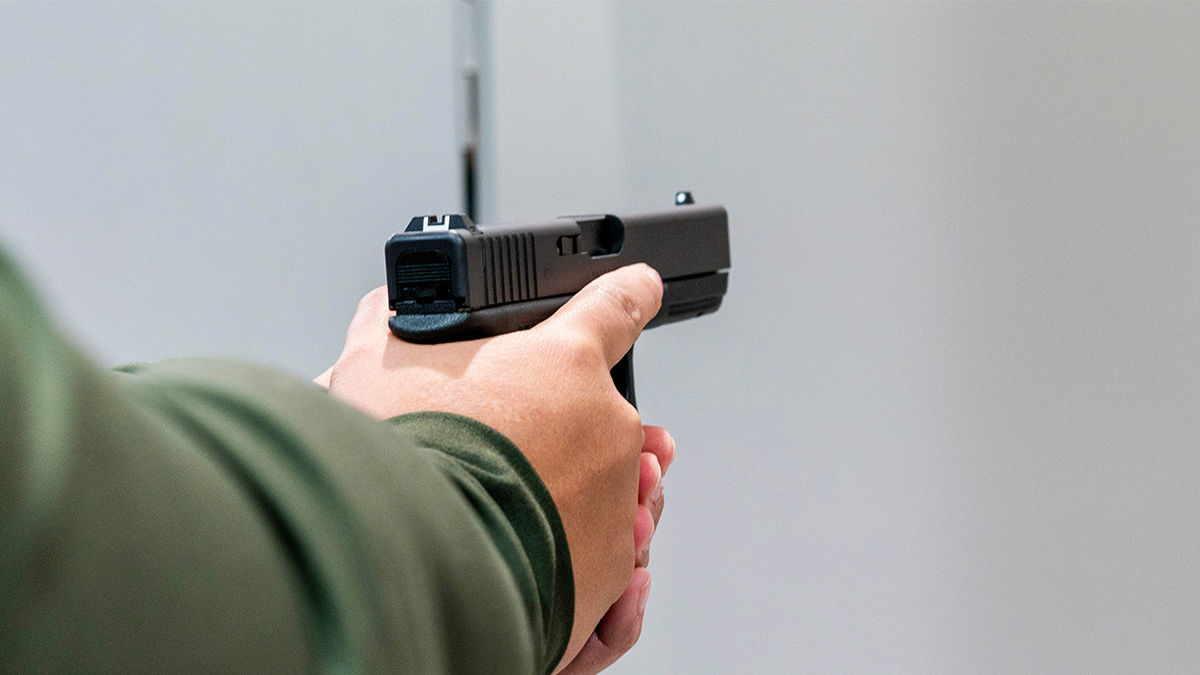
A customer holds a Glock 17 pistol for sale at a gun store. (Kyle Grillot/Bloomberg via Getty Images)
"Arming teachers is a controversial plan, carefully being tested within limited stations—as it creates issues for both teachers and the precious lives they strive to protect," career prosecutor, behavioral analyst and certified threat manager Wendy Patrick said.
According to Patrick, one of the "major issues" is that teachers are not cops and often do not have formal weapons training. Instead, she suggested that teachers can function as the eyes and ears of the school and strive to get to know each student and foster positive relationships.
"However, because when bullets start flying, time is of the essence, proponents of arming teachers argue that having weapons accessible can stop a shooter before needless lives are lost," Patrick added. "But that assumes an armed teacher is also proficient in shooting and crisis management because having guns accessible means they might be accessed by the wrong people or wrestled away from teachers unfamiliar with how to handle them."
To mitigate some of these concerns, Heinz said that teachers must be mentally fit and comprehensively trained, considering the mental and emotional toll of carrying a firearm in a school environment.
"Ultimately, the decision to arm teachers in Indiana should be made carefully, considering both local needs and national best practices. Comprehensive training, strict safety protocols, and ongoing evaluation are critical aspects of any policy that allows teachers to carry firearms," Heinz said.
WHY GUN OWNERSHIP IS SPIKING AMONG THIS DEMOGRAPHIC
Veteran Second Amendment journalist and Bearing Arms editor Cam Edwards said arming teachers is a "definite improvement" over the "status quo" of schools waiting for an armed response while a killer roams the halls.
Instead, his concern stemmed from the decision to store handguns in biometric safes where staff members cannot quickly grab them.
"Those tasked with serving as a first line of defense for students and staff should have immediate and ready access to a firearm if needed, and in my opinion, carrying that gun on their person would be more effective than forcing them to run to a 'strategic location' to retrieve a gun when a killer is on campus," Edwards said.
In early September, Randolph Central's school board unanimously adopted a plan where teachers and staff may volunteer to join an "armed response team" to afford them access to loaded handguns. These handguns are to be stored in biometric safes hidden strategically throughout the school buildings.
FIREARMS TRAINER RIPS LIBERAL STATE'S STRICT GUN BILL: ‘DISCRIMINATING AGAINST WOMEN’
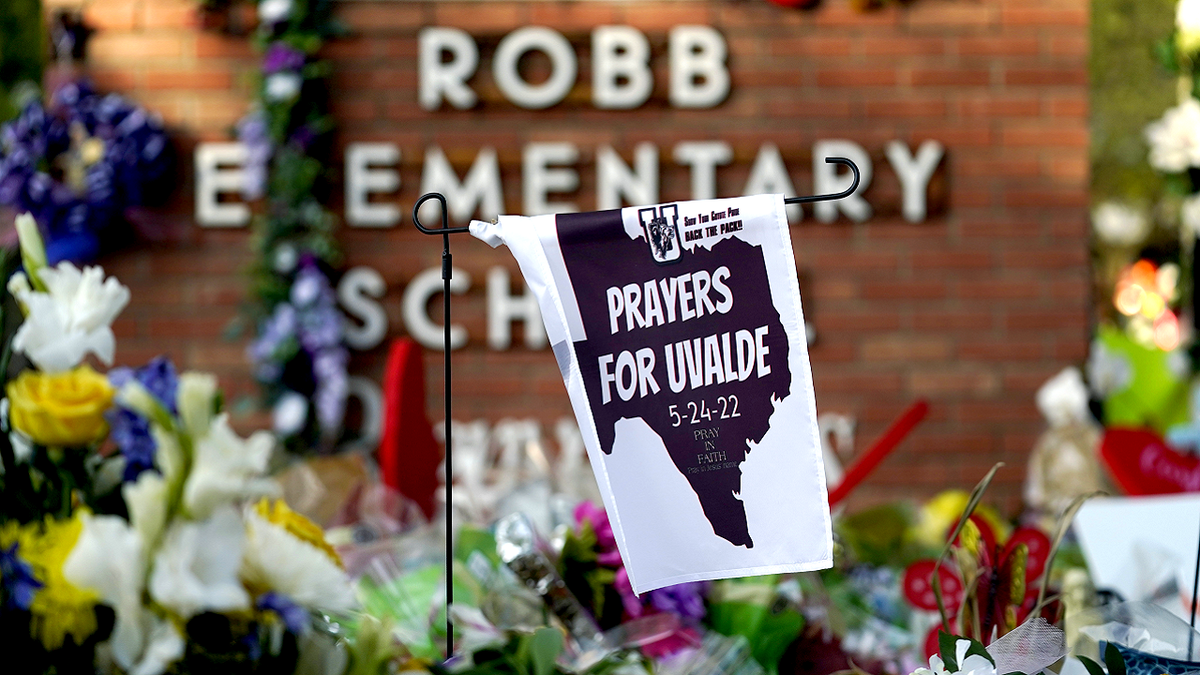
A banner hangs at a memorial outside Robb Elementary School, the site of a the mass shooting that killed 19 students and two teachers. (AP/Eric Gay)
The use of biometric safes was scrutinized by violence prevention trainer and security consultant Robert Sollars, who said guns stored in a school's main office would be nothing but a "hindrance" to the reaction of an incident.
"If a teacher on the response team has to go to the office and retrieve a firearm, the incident will be over," Sollars said. "Few incidents last as long as the Columbine incident did. That was over in about 10 minutes, 99% of all incidents are over within a matter of seconds and law enforcement is on the scene within 5 minutes, depending on the location of the school."
Yet, if the firearms are placed under teachers' desks or in close proximity to the classroom, Sollars said the move may prove beneficial.
"The only issue is that most teachers have never been in combat or law enforcement and therefore are not trained to take a life… Trauma and subsequent counseling must, absolutely must, be provided as well for those who shoot a kid, murderer or not," he added.
Erich Pratt, the Senior VP of Gun Owners of America, a grassroots lobbying organization, also highlighted the importance of allowing teachers to keep weapons on or near their person.
"GOA has been pushing states to arm willing teachers and staff for a long time, so we’re grateful to see even more states heeding the call," he said. "This is an encouraging move in Indiana, and we would encourage those districts to go even further by empowering staff to carry arms on their person, so they can truly respond to danger at a moment's notice."
Sollars also agreed that teachers should be armed, especially in larger schools, where even if the violence happens off-site, it can overflow onto the campus itself.
CLICK HERE TO GET THE FOX NEWS APP
For more Culture, Media, Education, Opinion and channel coverage, visit foxnews.com/media


